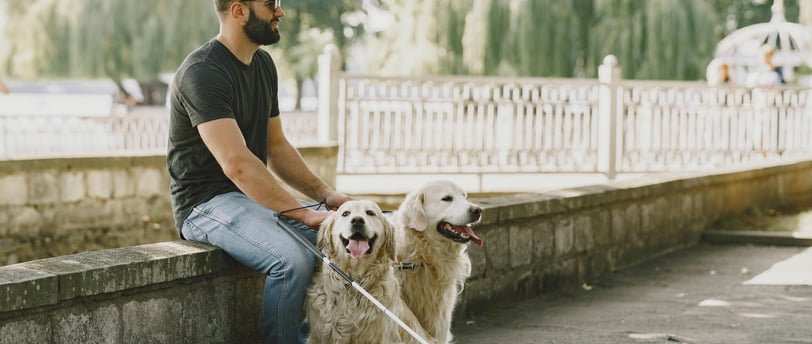What You Need to Know Before Getting a Service Dog
Thinking about getting a service dog? Discover the key factors to consider, including time commitment, costs, training, and more things you need to know to determine if a service dog is right for you.
BEGINNER BASICS
Crysta Germany
7/15/20244 min read


Key Factors to Consider
Getting a service dog can be both rewarding and challenging, and there are many factors you should consider before adopting. Outlined below are some of the most important things to consider, with positives and negatives listed. It's essential to weigh both sides to determine if a service dog is t truly the right choice for you.
1. Time Commitment
You'll need to devote significant time to training your service dog, even if you choose to adopt an already trained one. Service dogs require constant training to stay stimulated and proficient in their tasks. Time will also be needed for walking, grooming, training, and feeding your dog. Despite the commitment, this time can help build a strong bond between you and your dog, which can be very rewarding.
2. Public Accessibility
Service dogs are allowed to accompany their handlers nearly everywhere, offering greater freedom without relying on medical equipment or other people. However, the general public isn't well-educated about service animals and the laws protecting them, which can lead to confrontations and challenges in public spaces.
3. Financial Considerations
Service dogs come with high expenses, including vet bills, food, toys, and grooming. Service dogs also have specialized gear that can become quite costly. Additionally, there are costs associated with adopting a trained service animal or putting one through training. However, grants and financial aid opportunities are available to help with these experiences.
4. Training
Training your service dog from scratch takes a long time, and this time can vary depending on the dog and the tasks needed. It requires significant effort, and there will undoubtedly be tough days. Despite the challenges, watching your dog learn and grow can be extremely rewarding.
5. Lifestyle
A service dog can help you manage your disability, providing you with more freedom and confidence. However, you will likely need to make some lifestyle adjustments, especially if you don't already have a dog. The changes include things like modifying your schedule to include time for your dog, and changing plans if you feel bringing your service dog would pose too much of a challenge.
6. Social
Having a service dog can both open and shut social doors. It can lead to new social interactions and give you opportunities to form new friendships, and joining the service dog community can provide valuable support. however, having a pup at your side can draw unwanted attention- if you have anxiety, this could either help you work through it, or pose new challenges.
Conclusion
Before getting a service dog, it's crucial to consider these factors. You want to be sure that not only can your dog assist you, but you can also assist your dog. You want the partnership to be as positive and as strong as possible. Additionally, consult your doctors to explore alternatives and seek advice from current service dog handlers for their insights and suggestions.
photo credit: gustavo fring, matthias zomer, rdne on pexels



Key Factors to Consider
Getting a service dog can be both rewarding and challenging, and there are many factors you should consider before adopting. Outlined below are some of the most important things to consider, with positives and negatives listed. It's essential to weigh both sides to determine if a service dog is t truly the right choice for you.
1. Time Commitment
You'll need to devote significant time to training your service dog, even if you choose to adopt an already trained one. Service dogs require constant training to stay stimulated and proficient in their tasks. Time will also be needed for walking, grooming, training, and feeding your dog. Despite the commitment, this time can help build a strong bond between you and your dog, which can be very rewarding.
2. Public Accessibility
Service dogs are allowed to accompany their handlers nearly everywhere, offering greater freedom without relying on medical equipment or other people. However, the general public isn't well- educated about service animals and the laws protecting them, which can lead to confrontations and challenges in public spaces.
3. Financial Considerations
Service dogs come with high expenses, including vet bills, food, toys, and grooming. Service dogs also have specialized gear that can become quite costly. Additionally, there are costs associated with adopting a trained service animal or putting one through training. However, grants and financial aid opportunities are available to help with these experiences.
4. Training
Training your service dog from scratch takes a long time, and this time can vary depending on the dog and the tasks needed. It requires significant effort, and there will undoubtedly be tough days. Despite the challenges, watching your dog learn and grow can be extremely rewarding.
5. Lifestyle
A service dog can help you manage your disability, providing you with more freedom and confidence. However, you will likely need to make some lifestyle adjustments, especially if you don't already have a dog. The changes include things like modifying your schedule to include time for your dog, and changing plans if you feel bringing your service dog would pose too much of a challenge.
6. Social
Having a service dog can both open and shut social doors. It can lead to new social interactions and give you opportunities to form new friendships, and joining the service dog community can provide valuable support. however, having a pup at your side can draw unwanted attention- if you have anxiety, this could either help you work through it, or pose new challenges.
Conclusion
Before getting a service dog, it's crucial to consider these factors. You want to be sure that not only can your dog assist you, but you can also assist your dog. You want the partnership to be as positive and as strong as possible. Additionally, consult your doctors to explore alternatives and seek advice from current service dog handlers for their insights and suggestions.
photo credit: gustavo fring, matthias zomer, rdne on pexels



